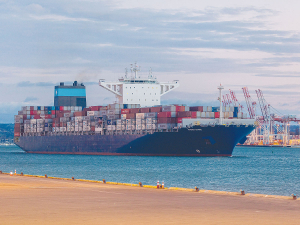Genetics, Efficiency and Performance: How the Burgesses are raising the bar at Te Poi
Bill and Michelle Burgess had an eye-opening realisation when they produced the same with fewer cows.
 Securing vital ocean freight has helped New Zealand dairy industry attract top price for its products.
Securing vital ocean freight has helped New Zealand dairy industry attract top price for its products.
Rising input prices mean dairy farmers need to look at ways of managing costs and produce milk efficiently.
That's the message from DairyNZ principal economist Graeme Doole.
He cautioned farmers that while the milk price is reaching a record level, they will be burdened with high cost inflation over the next two years.
"So it's just about planning and how we can reduce costs and be efficient in our production," he said.
"That's the big low hanging fruit for our industry."
Speaking at the recent DairyNZ Farmers Forum, Doole said Covid-19 is affecting the world trade situation - something he hasn't seen working in the economics field for the past 20 years.
"On the shipping, for example, we are having increases in shipping times of 75%," said Doole.
"Seen in the last six months alone, the cost of shipping goods from Asia to the US has gone up by 15 times - this is just due to port delays and closures."
Input costs on farms are also rising.
Doole notes that superphosphate prices are up 15% and urea 67% since last year.
However, global demand for food remains high, despite prices rising a third on average compared to last year.
For next season, Doole is predicting a $6.50/kgMS milk price.
Doole is banking on global milk supply to increase next year.
He notes that two of the world’s largest milk producers – the EU and the US – will produce more milk next season.
“I expect them to be 1% up rather than 1% down as they are this year,” he says.
“This will put more milk and dairy products into the global markets. With the increase in global supply, we expect prices will come down but will still be around the average price that we have seen. We are looking at $6.50 given the world isn’t going to correct itself anytime soon.”
He believes New Zealand farmers will remain in the box seat thanks to better access to ocean freight and cost effective systems based on pasture grazing.
Shipping Is Key
Very good access to ocean freight has helped New Zealand dairy farmers attract top prices for their products.
Graeme Doole, DairyNZ, says secure shipping services has helped us maintain access to international demand.
The high milk price has also been helped by poor production seasons in the US and the EU - down by 1 to 1.5% in milk yield.
"This means the low supply is pushing prices up," says Doole.
He notes that all agricultural sectors across the globe have been affected by the pandemic - some even more impacted than NZ.
He says NZ dairy has done the fundamentals well, resulting in a strong milk price and its flow-on benefits to the economy.
"We are the most competitive dairy producer in the world with well established ways of farming - farming pasture with good grazing skills and financial management."
He notes that countries with less developed export functions aren’t doing so well.
The US, for example, is producing more milk but they are finding it hard to get their dairy products on ships.
“Ships are being paid 15 times more to carry goods from Asia to the US; they are unloading goods and going straight back to Asia without filling up with US products,” says Doole.
Dairy prices have jumped in the overnight Global Dairy Trade (GDT) auction, breaking a five-month negative streak.
Alliance Group chief executive Willie Wiese is leaving the company after three years in the role.
A booklet produced in 2025 by the Rotoiti 15 trust, Department of Conservation and Scion – now part of the Bioeconomy Science Institute – aims to help people identify insect pests and diseases.
A Taranaki farmer and livestock agent who illegally swapped NAIT tags from cows infected with a bovine disease in an attempt to sell the cows has been fined $15,000.
Bill and Michelle Burgess had an eye-opening realisation when they produced the same with fewer cows.
It was love that first led Leah Prankerd to dairying. Decades later, it's her passion for the industry keeping her there, supporting, and inspiring farmers across the region.
President Donald Trump’s decision to impose tariffs on imports into the US is doing good things for global trade, according…
Seen a giant cheese roll rolling along Southland’s roads?